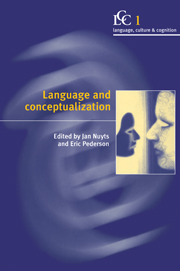Book contents
- Frontmatter
- Contents
- 1 Overview: on the relationship between language and conceptualization
- 2 From outer to inner space: linguistic categories and nonlinguistic thinking
- 3 Spatial operations in deixis, cognition, and culture: where to orient oneself in Belhare
- 4 Remote worlds: the conceptual representation of linguistic would
- 5 Role and individual interpretations of change predicates
- 6 Changing place in English and German: language-specific preferences in the conceptualization of spatial relations
- 7 Mapping conceptual representations into linguistic representations: the role of attention in grammar
- 8 Growth points cross-linguistically
- 9 On the modularity of sentence processing: semantical generality and the language of thought
- 10 The contextual basis of cognitive semantics
- 11 The cognitive foundations of pragmatic principles: implications for theories of linguistic and cognitive representation
- Subject index
- Index of names
4 - Remote worlds: the conceptual representation of linguistic would
Published online by Cambridge University Press: 05 June 2012
- Frontmatter
- Contents
- 1 Overview: on the relationship between language and conceptualization
- 2 From outer to inner space: linguistic categories and nonlinguistic thinking
- 3 Spatial operations in deixis, cognition, and culture: where to orient oneself in Belhare
- 4 Remote worlds: the conceptual representation of linguistic would
- 5 Role and individual interpretations of change predicates
- 6 Changing place in English and German: language-specific preferences in the conceptualization of spatial relations
- 7 Mapping conceptual representations into linguistic representations: the role of attention in grammar
- 8 Growth points cross-linguistically
- 9 On the modularity of sentence processing: semantical generality and the language of thought
- 10 The contextual basis of cognitive semantics
- 11 The cognitive foundations of pragmatic principles: implications for theories of linguistic and cognitive representation
- Subject index
- Index of names
Summary
Linguistic and conceptual representation: how close are they?
This chapter is based on the assumption that linguistic and conceptual processes tend towards isomorphism rather than, say, identity. This is, first, because notions of system economy suggest that there is a single master blueprint for all cognitive processes; any differences (leading to isomorphism, therefore, and not full identity) come about to the extent that the various processes operate with different inputs, function differently, or whatever. Secondly, a reasonable view of the developmental process would suggest that the child comes genetically equipped, to some extent, not only for language but also for other kinds of conceptualization. Just as specific language development is then further guided by the specific linguistic environment of the child, so are the other kinds of conceptual development guided and moulded by the child's cognitive environment, for example the cultural, social, and educational circumstances. Thirdly, linguistic and conceptual development are not merely parallel processes but are intimately intertwined at all stages, giving further support to the notion that they must be isomorphic. I propose to provide some indication that such isomorphism may well be the case by showing how an account of the conceptual representation underlying discourse seems to provide a unified explanation for the many different uses of the item would. First, though, I'll briefly look at a handful of cases where would doesn't get used.
- Type
- Chapter
- Information
- Language and Conceptualization , pp. 84 - 115Publisher: Cambridge University PressPrint publication year: 1997
- 4
- Cited by

